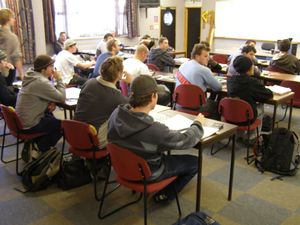Learning and teaching methods
| Learning and Teaching in Practice | |
|---|---|
| Module 2: Adult learning theory and Praxis | |
| Andragogy | Introduction | Models for learning | Learning and teaching methods | Feedback models | Summary |
Teachers need to use a variety of methods when facilitating learning experiences for adults. Skills for independent and self-directed learning need to be recognised and scaffolded appropriately. Existing experience needs to be acknowledged and built on through active learning.
Expert adult learners: To engage and motivate adult students, 10 learning and teaching principles and theories are recommended, and are outlined in Goalposts. This is a the New Zealand-based resource, based on current and influential ideas. It is aimed at new teachers but is also relevant for experienced teachers.
- Prior knowledge and experience
- The importance of culture
- Respectful partnerships and relationships
- Autonomous and independent
- Goals and motivation
- Relevant and practical
- Learning styles and ways of thinking
- Critical reflection
- Environment for learning
- Change and transformative learning.
(Honeyfield & Fraser, 2013).
Work-based training: Nancy Johnson (2011) has prepared a useful article about Facilitating the best adult learning experiences. She explains What? Why? and How? in five steps with an overview of some techniques for providing a range of different learning experiences. It has a focus for training in the workplace. Suggestions for using audiovisual tools are suggested.
Vocational education: Lucas, Spencer and Claxton (2012) describe a number of methods for learning and teaching in vocational settings. How to teach vocational education: a theory of vocational pedagogy.
References
- Lucas, B., Spencer, E. & Claxton, G.(2012). How to teach vocational education: a theory of vocational pedagogy. UK: the City & Guilds Centre for Skills Development (CSD). Retrieved from http://www.winchester.ac.uk/aboutus/lifelonglearning/CentreforRealWorldLearning/Documents/How-to-teach-vocational-education%20Bill%20Lucas%20Ellen%20Spencer%20and%20Guy%20Claxton.pdf
- Honeyfield, J. & Fraser, C. (2013). Goalposts: A professional development resource for new tertiary teachers in their first year. Ako Aotearoa. Retrieved from https://akoaotearoa.ac.nz/ako-hub/ako-aotearoa-northern-hub/resources/pages/goalposts-professional-development-resource-new-tertiary-teachers-their-first-
